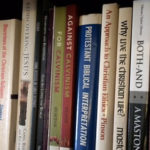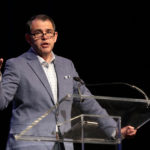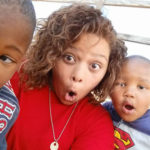CORPUS CHRISTI—Visually, Ed Seay and his son, Chris, are a little like Windows 95 and Apple iOS 6.
Speaking to the Baptist General Convention of Texas annual meeting, the father wore a pressed blue shirt, tie and crisp gray suit of an established, 60-something Baptist preacher. His bearded son sported faded slim-cut blue jeans, a broken-in blue shirt and a rumpled gray jacket befitting an emergent church starter.

Chris Seay, pastor of Ecclesia in Houston, and his father, Ed Seay, pastor of First Baptist Church in Magnolia, address the Baptist General Convention of Texas annual meeting. (PHOTO/Robert Rogers/Buckner University)
|
Chris Seay is pastor of Ecclesia, an emergent church in Houston. Ed Seay is pastor of First Baptist Church in Magnolia.
A third-generation pastor who grew up steeped in Texas Baptist culture, Chris Seay described the generational differences between the men of God in his life. Their styles may differ, but their goals are the same.
"Where my dad I would describe as a Chuck Swindoll-esque Bible teacher, my grandfather, Bob Baldwin, was the moderator of the association, a faithful Baptist pastor —and he was a little more hellfire and brimstone. If he was here now, he'd turn up the heat, preach on hell, and some of you Baptist pastors would walk the aisle just to make sure one more time," he said.
Seay shared the story of the time he damaged his intimidating Baptist grandfather's only two valuable possessions—his new car and his house—in one unfortunate accident. As a 16-year-old, Chris stood trembling in the driveway, waiting for his grandfather's wrath to rain down. But it never came. Instead, his grandfather put his hand on the teenager's neck, kissed him on the forehead and said: "Son, it's OK. It's just a thing. It's just a thing."
At that moment, Seay said, he knew that his grandfather loved him more than that car.
That, he said, was the first thing Texas Baptists do when they're at their very best. "Whatever you do, whatever you're up to, whatever your church has been called to, make sure that love is the dominant activity in what we do and who we are," he said.
Sign up for our weekly edition and get all our headlines in your inbox on Thursdays
The second greatest lesson from Texas Baptists is their passionate and deep love for Scripture, he said. The important things he learned, to read the Bible 'well and often,' also requires reading them humbly, he added.
"You read it with a sense that God is teaching you something, and I'm afraid that often as Baptists, as Christians, as people or denominations, we get caught up reading the Bible ready to fight with other people," he said. "We're reading it to justify how right we are. And it doesn't work well. … The Bible was meant to be a sword, but not one we hack other people with—one that's intended to do surgery on our own hearts."
The final quality of Texas Baptists that had a profound impact on Seay's life was a penchant for risk-taking. He told the story of making an appointment with the church starting center at the BGCT at the ripe age of 23. He had served as pastor at a handful of small, rural churches and had come to the BGCT with a vision.
"I said, 'I've got this friend, we've been playing in a band, and his name is David Crowder and we want to start a church together.' And (the church starting center representative) should have said, 'You come back to me in 10 years when you've figured something out.' But he didn't. He said, 'I think the Lord's leading you and I want to invest in you.' And through the Cooperative Program, through your work together, we planted a church that continues to thrive in a university context."
He encouraged listeners to continue taking risks, to not be afraid of change and to think about getting smaller in order to become more effective.
He also delivered two challenges—to not assume that reaching more people means adding "contemporary" features to the way churches do things, and to be mission-minded.
What people crave is authenticity, he said. Seay described his Houston church, Ecclesia, that is thriving in an area of Houston where churches normally don't do well. He noted 90 percent of their worship songs are hymns, their services rely heavily on liturgy and they celebrate the Lord's Supper every week.
"We read these responsive prayers together in a way that is not contemporary in many ways," he said. "And yet, what it is is authentic. I believe ultimately that friendships are formed and relationships happen out of weakness. So my prayer is that you would be people that are authentic in your communities. Acknowledge your sin, your brokenness, your weakness. It's in those places that God moves significantly."
Finally, the emerging generation craves the thrill of a challenge and connection with a mission, he said.
"Paint a picture of the kingdom of God and call them to affect it, to bring it into reality, and they are ready for that challenge," he said. "They don't want to fund a building that's going to be used two hours a week. They don't. They won't get excited. But if you tell them about communities in desperate need that need clean water, they'll respond and they'll do it."
Ed Seay closed the presentation with advice for empowering the next generation of church leaders.
"Bless them in the Lord," he said. "Then set them free and don't expect them to live up to our expectations or traditions, but to follow Christ alone. Let the expression of the gospel be lived out in the context of the culture they're called to reach, and we'll see many come to faith because of that blessing."














We seek to connect God’s story and God’s people around the world. To learn more about God’s story, click here.
Send comments and feedback to Eric Black, our editor. For comments to be published, please specify “letter to the editor.” Maximum length for publication is 300 words.